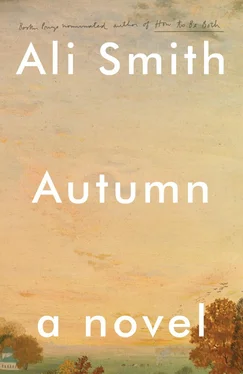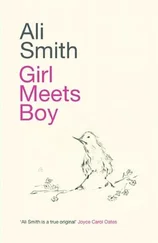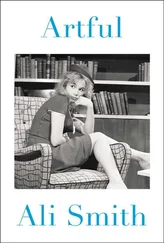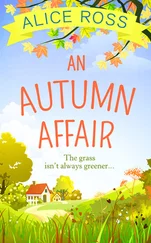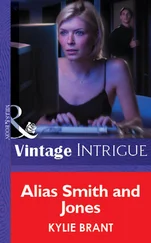All across the country all the things from the past stacked on the shelves in the shops and the barns and the warehouses, piled into display units and on top of display units, spilling up stairs from the cellars of the shops, down stairs from the attic rooms of the shops, like a huge national orchestra biding its time, the bows held just above the strings, all the fabrics muted, all the objects holding still and silent till the shops empty of people, till the alarms play their electronic beeps at the doors, till the keys turn in the locks in the thousands of shops and barns and warehouses all across the country.
Then, when darkness falls, the symphony. Oh. Oh, that’s a beautiful idea. The symphony of the sold and the discarded. The symphony of all the lives that had these things in them once. The symphony of worth and worthlessness. The Clarice Cliff fakes would be flutey. The brown furniture would be bass, low. The photographs in the old damp-stained albums would be whispery through their tracing paper. The silver would be pure. The wickerwork would be reedy. The porcelains? They’d have voices that sound like they might break any minute. The wood things would be tenor. Yes, but would the real things sound any different from the reproduction things?
The women start to laugh.
Elisabeth can smell smoke.
No. She can smell dope.
She lies back down on the sofa and listens to them laughing about the number of times they spoiled the set-up of shots on their filming of The Golden Gavel by laughing in the wrong places or not saying the right thing. She gathers, from what they say, that there was quite a fuss caused by her mother’s stubbornness, refusing to say the hello to the person who owned the antiques shop they were filming in as if they were just meeting for the first time, when truthfully they’d met an hour beforehand and she’d done the take already five times. Hello again! she said every time. Cut! the production team yelled.
I just couldn’t do it, her mother says. It was so stupidly false. I was hopeless.
You were. And it gave me such hope, the new friend says.
Elisabeth smiles. That’s nice.
She sits up. She goes through to the kitchen. The supper things are all still out on the table waiting to be cooked.
She goes through to the sitting room instead and the room is fuggy with dope. Her mother’s new friend Zoe is sitting on the chaise longue and her mother is sitting in her new friend’s lap. They’ve got their arms round each other like the famous Rodin statue, in the middle of the kiss.
Ah, Elisabeth says.
Zoe opens her eyes.
Uh-oh. Caught, she says.
Elisabeth watches her mother struggle to retain not just her composure but any balance at all on her new friend’s knee.
She winks at her mother’s new friend through the dope smoke.
She’s been waiting for you since she was ten years old, Elisabeth says. I’ll make supper, shall I?
It was a sunny Friday evening more than a decade ago,in the spring of 2004. Elisabeth was nearly twenty. She was staying in. She was watching Alfie, a film meant to have an appearance by Pauline Boty in it. The film starred Michael Caine as a philanderer. It had been a very groundbreaking film at the time because Caine as Alfie spoke so frankly, straight to camera, and about sexual adventuring.
Quite early on in the film Michael Caine walks along a bright sunny 1960s London street and knocks on the glass of a window saying Prompt Service Within, to get the attention of a young woman in the window.
It’s her.
She turns, looks delighted and beckons him in. As he goes through the door he switches the open sign to closed and follows her to the back. Then he takes her in his arms and kisses her, and then slips behind the clothes-rack for a comedy quick one three seconds long with her.
It was definitely Pauline Boty.
It was filmed the year before she died.
Her name wasn’t in the credits.
I was having a beautiful little life, and I couldn’t see it , the Michael Caine voiceover said. There was this manageress of a dry-cleaner’s. He went into the shop, behind the clothes with the girl, then a few moments later came out the other side saying, and I was getting a suit cleaned in the bargain .
According to what Elisabeth had read about her life, Boty was already pregnant in these shots.
She was wearing a bright blue top. Her hair was the colour of corn.
But you can’t write that in a dissertation. You can’t write, she made it look like a blast . You can’t write, she looked like she’d be really good fun, like she was full of energy, or energy comes off her in waves . You can’t write, even though it’s a lot more like the language expected, though she’s in that film for less than twenty seconds she adds something crucial and crucially female about pleasure to its critique of the contemporary new and liberated ethos, which was indeed what she was also doing with her aesthetic .
Blah.
Elisabeth opened the Boty catalogue again and flicked through it. The wild bright colours came off the pages at her as she did.
She stopped on one of the long-lost pictures, the one of Christine Keeler on the chair. Keeler had slept with two men, one had been Secretary of State for War in the government in London, one had been a Russian diplomat, and it was about blatant lying in Parliament, then about who had most power and who owned information about nuclear weapons — except that it soon, ostensibly at least, became about something else altogether, about who owned Keeler, who farmed her out, and who did or didn’t make money out of it.
The Boty picture, Scandal 63, had been missing since the year it was painted. There were only photographs of it. In the finished version, Boty had painted Keeler on her Danish chair surrounded by abstracts, though some of the abstracts looked more figurative: that, there on the left, arguably, was a tragedy mask; that down there was a woman having what looked like an orgasm. Above Keeler on the chair, on something resembling a dark balcony, Boty had painted, a bit like decapitated heads on a city wall, the heads and shoulders of four men, two black men and two white men. In an earlier version, which you could see half of in a picture with Boty herself in it, you got a sense of the size of the picture, big enough to come up quite far past Boty’s waist. In this earlier version Boty didn’t use the famous image of Keeler in the chair. She changed her mind for the later version, and did.
Elisabeth wrote in pencil on a page of her foolscap pad: art like this examines and makes possible a reassessment of the outer appearances of things by transforming them into something other than themselves. An image of an image means the image can be seen with new objectivity, with liberation from the original.
Dissertation blah.
She looked at the photograph of Boty standing beside Scandal 63. She took the book over to the window to see the photographs in what was left of the daylight.
No one knew who’d commissioned this painting.
No one knew where it was now, if it was still anywhere, if it still existed.
She looked again at how the mask, the gargoyle tragedy face, formed and unformed itself at the side of the picture.
Elisabeth had tried to read up about the Scandal scandal so she could think about and write about this picture. She’d read everything she could find online and everything in the library: some cultural books about the 1960s, a couple of books by Keeler, a copy of the Denning Report on the Scandal scandal. She hadn’t known that proximity to lies, even just reading about them, could make you feel so ill. The whole thing was a bit like being made to watch something as innocent as Alfie through a gimp mask and a lot of painful S&M gear you’d never agreed to wear in the first place.
Читать дальше
